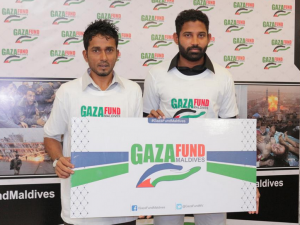The slow loris illegally trafficked into the Maldives has been spared euthanasia after Monkey World – a center for abused and neglected primates – offered to re-home the animal at their sanctuary in Dorset, England.
“This has never been done before, to move endangered species overseas from the Maldives. This has been an amazing, unprecedented international effort,” Dr Alison Cronin, Director of Monkey World told the press in Malé today (August 13).
The small primate, which is an Appendix I listed species of CITES – giving it the highest level of protection in international trade of wildlife – was discovered during a police raid in the capital in January.
Shazra Shihab from the Ministry of Environment and Energy explained that the government had been trying to rehome the animal ever since, but had struggled due to issues relating to costs, transportation, and the loris’s unknown country of origin.
“However, with tireless dedication from one party, and cooperation from all relevant government organisations of both countries, as well as dedication from other involved parties on both sides, we have now found a home for the slow loris,” she added.
“I first heard that the Bengal Loris had been confiscated in the Maldives by colleagues who work in Asia rescuing wildlife,” Dr Cronin told Minivan News.
The animal will now be taken back to the UK and paired with another of its species, she explained.
“We believe this to be a male Loris, and we have a home for it in England with a female Loris, so he will have a wife,” Dr Cronin added.
“We’ve been doing this work around the world for more than 25 years and I was impressed, heart-warmed and felt that everybody here deserved support and encouragement for what they’ve done.”
Echoing Dr Cronin’s sentiments, Gabriella Tamási from the International Airline Group IAG Cargo remarked, “this is totally unprecedented, what we have done to transport the slow loris, as currently our travel operations in the Maldives are not approved for live animal transport.”
Illegal slow loris trade
The illegal Loris pet trade boomed after video clips which depict the animals as a cute and docile pets went viral. However, the video craze has obscured the trauma and suffering that the animals endure at the hands of illegal traffickers.
Far from its cuddly depiction, the Loris secretes toxins on its wrists which – when combined with their saliva – deliver a toxic and very harmful bite, Dr Cronin explained.
“Most commonly what happens is they get grabbed and somebody forces their mouth open, and they take large fingernail clippers and simply cut the animals teeth off at the gum line.”
“It’s a very bloody, painful and horrible process, leaving the animal crippled,” revealed Dr Cronin.
According to Dr Cronin, the Bengal slow loris in the Maldives has not been checked over yet, as she prefers to minimise the stress for the animal during the transportation process.
“The last thing it needs is more stress,” she stated, “we’ll wait until we get it back to Monkey World.”
Dr Cronin also revealed plans to check the slow loris’ DNA once back in the UK, to find out the animal’s country of origin, which may then present the possibility to a return to the wild.
“Everybody in the Maldives can feel pleased and proud of both the law enforcement and the government ministry for bothering to stick with this for so long,“ Dr Cronin concluded.
